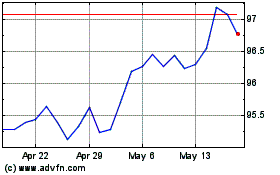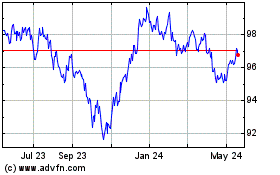AGG vs. BND: Which Bond ETF Do You Choose? - ETF News And Commentary
January 22 2013 - 7:01AM
Zacks
While corporate bonds are increasingly popular among
investors—along with junk securities due to their outsized yield—a
broad bond approach is taken by many as well. For ETFs that target
this broad fixed income space, generally investors focus in on two
ultra-popular ETFs; the Vanguard Total Bond Market ETF (BND) and
the iShares Core Total U.S. Bond Market ETF (AGG).
These two giants combine to take up over $30 billion in total
assets, making them both among the top five bond ETFs by total AUM.
Furthermore they both track the same benchmark, the Barclays
Capital U.S. Aggregate Bond Index, so exposure is going to be quite
similar (see Target Date Bond ETFs Best or Worst Fixed Income
Funds?).
So how do investors pick between the two?
Well, although they are very similar, there are actually some
key differences between the two and their fund holdings, expenses,
and tradability. So while they might appear identical, some
differences in sampling and other important factors should be known
by investors before deciding between either of these for their
portfolio:
Vanguard Total Bond Market ETF (BND)
This ETF is the slightly more popular of the two, having amassed
over $17 billion in total assets. Volume is also a tad better for
this fund, but both see more than one million shares move hands on
a daily basis so bid ask spreads shouldn’t be too much of a
concern.
In terms of exposure, it is well spread out with intermediate
term bonds accounting for roughly 40% of assets, long term another
40%, and short term the rest. Meanwhile from a bond type look,
federal debt accounts for about 45% of the product, with corporates
and collateralized securities accounting for the rest (see Seven
Biggest Bond ETFs by AUM).
Performance has also been strong in this ETF, with more than
29.8% gains in the trailing five year period. Yields, however, are
a little light thanks to the heavy government bond component,
helping to push the 30-Day SEC yield to just 1.67%.
iShares Core Total U.S. Bond Market ETF
(AGG)
While this ETF may not be as popular or widely traded as BND, it
is older than its Vanguard counterpart, and thanks to its
rebranding, is now cheaper too. In fact, the ETF charges investors
just eight basis points a year in fees, beating out BND by two
basis points a year.
The ETF also has a bit more of a long-term focus, as these
securities account for roughly 55% of assets, followed by just 27%
for intermediate term notes. Meanwhile, federal debt only takes up
about one-third of the assets, putting collateralized debt at
roughly half the portfolio, and corporates with nearly all of the
rest, according to XTF.com.
In addition to having a lower expense ratio, AGG also has a
slightly lower yield, just four basis points lower than BND in
fact. However, performance in this iShares ETF has been better over
the long-term as in the trailing five year period the fund has
gained 28.9% (also see Forget Interest Rate Risk with These Bond
ETFs).
The Bottom Line
So while AGG and BND both offer up quality exposure across the
various types of fixed income securities in the U.S. market, they
do so in slightly different ways with different levels of both
liquidity and fees.
Although these differences might not appear to be much at first
glance, these issues can definitely influence returns and should be
something to note by investors before deciding which of the two to
purchase during these uncertain market times.
|
|
BND
|
AGG
|
|
Expense Ratio
|
0.10%
|
0.08%
|
|
Total Holdings
|
4,500+
|
1,666
|
|
30-Day SEC Yield
|
1.7%
|
1.6%
|
|
Treasury Component
|
36%
|
32%
|
|
Top Holding
|
T-Bill, due 2017 (12.2% of fund)
|
T-Bill, due 2014 (2.4% of fund)
|
|
Five Year Performance (XTF.com)
|
29.7%
|
28.9%
|
Want the latest recommendations from Zacks Investment Research?
Today, you can download 7 Best Stocks for the Next 30
Days. Click to get this free report >>
ISHARS-BR AG BD (AGG): ETF Research Reports
VANGD-TOT BOND (BND): ETF Research Reports
To read this article on Zacks.com click here.
Zacks Investment Research
Want the latest recommendations from Zacks Investment Research?
Today, you can download 7 Best Stocks for the Next 30 Days. Click
to get this free report
US Aggregate (AMEX:AGG)
Historical Stock Chart
From Jan 2025 to Feb 2025

US Aggregate (AMEX:AGG)
Historical Stock Chart
From Feb 2024 to Feb 2025
